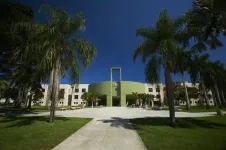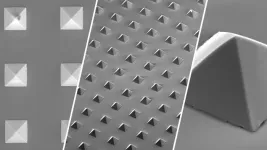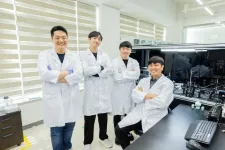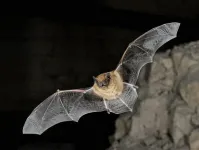(Press-News.org) Humans are social creatures and learn from each other, even from a young age. Infants keenly observe their parents, siblings or caregivers. They watch, imitate and replay what they see to learn skills and behaviors.
The way babies learn and explore their surroundings inspired researchers at Carnegie Mellon University and Meta to develop a new way to teach robots how to simultaneously learn multiple skills and leverage them to tackle unseen, everyday tasks. The researchers set out to develop a robotic AI agent with manipulation abilities equivalent to a 3-year-old child.
The team has announced RoboAgent, an artificial intelligence agent that leverages passive observations and active learning to enable a robot to acquire manipulation abilities on par with a toddler.
“RoboAgent is a critical milestone toward general robotic agents that are efficient learners, effective in novel situations and capable of expanding their behaviors over time,” said Vikash Kumar, adjunct faculty in the School of Computer Science’s Robotics Institute. “Current robots are highly specialized and trained for individual tasks in isolation. In contrast, we set out to create a single artificial intelligence agent capable of exhibiting a wide range of skills in unseen scenarios. RoboAgent learns like human babies — leveraging a combination of abundant passive observations and limited active play.”
RoboAgent can complete 12 manipulation skills across differing scenes. This research points toward a robotic learning platform adaptable to changing environments. Unlike past research, the team demonstrated their work in real environments — not simulation — and did so with far less data than previous projects.
“RoboAgents are capable of much richer complexity of skills than what others have achieved,” said Abhinav Gupta, an associate professor in the Robotics Institute. “We’ve shown a greater diversity of skills than anything ever achieved by a single real-world robotic agent with efficiency and a scale of generalization to unseen scenarios that is unique.”
The team’s agent learns through a combination of self-experiences and passive observations contained in internet data. As a parent would guide their child, researchers teleoperated the robot through tasks to provide it with useful self-experiences.
“The effectiveness and efficiency of our approach stem from our novel policy architecture that allows our agents to reason even with limited experiences,” said Homanga Bharadwaj, a Ph.D. student in robotics. “RoboAgent acts in response to specified text/visual goals by predicting and aggregating decisions in terms of temporal chunks of movements instead of commonly used per-timestep actions.”
Robots primarily learn from their own experiences, not from what happens passively around them. This inherent blindness to what goes on in their environment fundamentally limits both the diversity of experiences robots are exposed to and their abilities to adapt to new situations. To overcome these limitations RoboAgent learns from videos on the internet — akin to how babies acquire knowledge and behaviors by passively observing their surroundings.
“RoboAgent leverages the information contained in these videos to learn priors about how humans interact with objects and use various skills to successfully complete tasks,” said Mohit Sharma, a Ph.D. student in robotics. “Additionally, observing similar skills in multiple scenarios allows it to learn what is and isn't necessary to complete a task. It leverages these lessons when presented with unknown tasks or unseen environments.”
“An agent capable of this sort of learning moves us closer to a general robot that can complete a variety of tasks in diverse unseen settings and continually evolve as it gathers more experiences,” said Shubham Tulsiani, an assistant professor in the Robotics Institute. “RoboAgent can quickly train a robot using limited in-domain data while relying primarily on abundantly available free data from the internet to learn a variety of tasks. This could make robots more useful in unstructured settings like homes, hospitals and other public spaces.”
The team is open-sourcing its trained models, codebase, hardware drivers and — most notably — the entire dataset collected on this research. RoboSet is the largest publicly available robotics dataset on commodity hardware. The team hopes this will enable others to reuse, adapt and pass it forward, leading to a truly foundational general robotic agent over time.
The research team includes Kumar, Tulsiani, Gupta, Bharadwaj, Sharma and Jay Vakil from Meta AI. More information about RoboAgent and RoboSet is available on the project’s website.
END
Parenting a 3-year-old robot
Carnegie Mellon University, Meta AI researchers develop robotic learning agent able to master multiple skills
2023-08-08
ELSE PRESS RELEASES FROM THIS DATE:
Study compares youth detained for sex trafficking with more serious offenders
2023-08-08
Every year in the United States, about 1.7 million youth run away from home, which places them at risk for sex trafficking and prostitution. Sadly, most youth tend to fall victim to sex trafficking between the ages of 12 to 14.
While federal and state laws have been enacted to protect these runaway youth, they continue to be arrested, charged and detained for prostitution. Detaining youth who should not legally be considered offenders and who have extensive histories of victimization and mental health issues only exacerbates their underlying vulnerabilities that may have led them to run away or be sexually exploited in the first place.
There is ...
Insilico Medicine joins Montreal Chamber of Commerce to drive continued innovation
2023-08-08
Insilico Medicine (“Insilico”), a clinical stage generative artificial intelligence (AI) drug discovery company, has announced that it is now a member of the Chamber of Commerce of Metropolitan Montreal, demonstrating its commitment to the vibrant business community of Montreal and to fostering economic growth in the region. Insilico will officially launch its AI R&D Center in Montreal later this fall.
As a new member of the Chamber of Commerce of Metropolitan Montreal, Insilico brings its innovative expertise ...
'Crushing' chemical innovations at the heart of newly expanded NSF Center
2023-08-08
NEW YORK, August 8, 2023 — CUNY ASRC researcher Adam Braunschweig’s lab is part of a newly awarded $20 million center from the U.S. National Science Foundation to understand the atomic-scale mysteries of "crushing" chemistry. The multi-institutional award will establish the Center for the Mechanical Control of Chemistry (CMCC), which will conduct work to understand how the mechanical application of force can enable new advances in chemistry and make industrial processes cheaper and more environmentally friendly.
“I’m excited that my lab is playing a part in research ...
Bighorn sheep associations: understanding tradeoffs of sociality and implications for disease transmission
2023-08-08
Sociality plays a pivotal role in the lives of many animal species, influencing mating success, survival rates, and susceptibility to diseases. In the challenging environment of bighorn sheep populations, sociality is believed to have evolved for its fitness benefits. However, the delicate balance of costs and benefits associated with sociality can vary at different scales, leading to diverse interpretations of animal behavior.
New research titled "Bighorn sheep associations: understanding tradeoffs of sociality and implications for disease transmission" has been published in PeerJ Life & Environment. The study, ...
Lead poisoning from Ayurvedic medicines: rare but cautionary
2023-08-08
An article in CMAJ (Canadian Medical Association Journal) highlights a case of lead toxicity from Ayurvedic medicines in a young woman, and the complexity in diagnosing the rare condition https://www.cmaj.ca/lookup/doi/10.1503/cmaj.230592.
"Given that lead toxicity is uncommon and its presentation nonspecific, patients are often seen by many health care providers before the diagnosis is made," writes Dr. Julian Gitelman, Dalla Lana School of Public Health, University of Toronto, with coauthors. "A careful exposure history is essential to suggest the diagnosis."
The patient, a 39-year-old woman, visited the emergency department 3 times in 6 weeks ...
Holidaymakers be warned: Short, intense sun-seeking trips can disrupt skin’s microbiome
2023-08-08
Skin, the largest organ of the human body, is home to a vast array of bacteria, fungi, and viruses – microorganisms that compose the skin microbiota. Among other things, these microbial populations, which are organized in complex community structures, protect against pathogens.
Prolonged exposure to UVR is associated with damage to DNA in skin cells, inflammation, and premature skin aging, yet intentional sun-seeking behaviors remain common.
Due to a lack of studies focusing on how individual behavior influences UVR-associated microbiota shifts, and how this may relate to skin health, ...
New Antarctic extremes ‘virtually certain’ as world warms
2023-08-08
Extreme events in Antarctica such as ocean heatwaves and ice loss will almost certainly become more common and more severe, researchers say.
With drastic action now needed to limit global warming to the Paris Agreement target of 1.5°C, the scientists warn that recent extremes in Antarctica may be the tip of the iceberg.
The study reviews evidence of extreme events in Antarctica and the Southern Ocean, including weather, sea ice, ocean temperatures, glacier and ice shelf systems, and biodiversity on land and sea.
It concludes that Antarctica’s fragile environments “may well be subject to considerable stress and ...
Three-dimensional printing achieves precision light control for structural coloration
2023-08-08
The world's first 3D printing technology that can be used in transparent displays and AR devices has been developed, which implements the physical phenomenon of chameleon's changing skin color or peacock's beautiful feather color.
Dr. Jaeyeon Pyo’s team at KERI has succeeded in realizing a three-dimensional diffraction grating that can precisely control the path of light based on 'nanoscale 3D printing technology'. This is a novel technology that can utilize the principle of structural color observed in nature ...
Well-designed digital health platforms can improve the quality of life for people with Parkinson’s disease and their caregivers
2023-08-08
Philadelphia, August 8, 2023 – There is a need to better deliver information on medical nutrition therapy for patients with Parkinson’s disease (PD). Findings of a new study in the Journal of Nutrition Education and Behavior, published by Elsevier, show digital health serves as an additional health service resource, which increases the healthcare provider’s abilities to collect current visual and objective data, thereby decreasing patient and caregiver burden and medical expenses.
Lead author Dara Lyn LoBuono, PhD, RD, assistant professor in health and exercise science at Rowan ...
Bat activity lower at solar farm sites, study finds
2023-08-08
The activity level of six bat species was significantly reduced at solar farm sites, researchers have observed.
Their findings, published today in Journal of Applied Ecology, have the potential to impact and inform planning legislation and policy so that the benefits of solar power are reaped without impacting wildlife.
Renewable technologies are important in meeting energy demands sustainably. This is of vital importance given the roles of fossil fuels in producing carbon dioxide, a key driver of climate change. Renewable energy is growing at a rapid pace globally, with solar photovoltaic power ...
LAST 30 PRESS RELEASES:
Globe-trotting ancient ‘sea-salamander’ fossils rediscovered from Australia’s dawn of the Age of Dinosaurs
Roadmap for Europe’s biodiversity monitoring system
Novel camel antimicrobial peptides show promise against drug-resistant bacteria
Scientists discover why we know when to stop scratching an itch
A hidden reason inner ear cells die – and what it means for preventing hearing loss
Researchers discover how tuberculosis bacteria use a “stealth” mechanism to evade the immune system
New microscopy technique lets scientists see cells in unprecedented detail and color
Sometimes less is more: Scientists rethink how to pack medicine into tiny delivery capsules
Scientists build low-cost microscope to study living cells in zero gravity
The Biophysical Journal names Denis V. Titov the 2025 Paper of the Year-Early Career Investigator awardee
Scientists show how your body senses cold—and why menthol feels cool
Scientists deliver new molecule for getting DNA into cells
Study reveals insights about brain regions linked to OCD, informing potential treatments
Does ocean saltiness influence El Niño?
2026 Young Investigators: ONR celebrates new talent tackling warfighter challenges
Genetics help explain who gets the ‘telltale tingle’ from music, art and literature
Many Americans misunderstand medical aid in dying laws
Researchers publish landmark infectious disease study in ‘Science’
New NSF award supports innovative role-playing game approach to strengthening research security in academia
Kumar named to ACMA Emerging Leaders Program for 2026
AI language models could transform aquatic environmental risk assessment
New isotope tools reveal hidden pathways reshaping the global nitrogen cycle
Study reveals how antibiotic structure controls removal from water using biochar
Why chronic pain lasts longer in women: Immune cells offer clues
Toxic exposure creates epigenetic disease risk over 20 generations
More time spent on social media linked to steroid use intentions among boys and men
New study suggests a “kick it while it’s down” approach to cancer treatment could improve cure rates
Milken Institute, Ann Theodore Foundation launch new grant to support clinical trial for potential sarcoidosis treatment
New strategies boost effectiveness of CAR-NK therapy against cancer
Study: Adolescent cannabis use linked to doubling risk of psychotic and bipolar disorders
[Press-News.org] Parenting a 3-year-old robotCarnegie Mellon University, Meta AI researchers develop robotic learning agent able to master multiple skills









